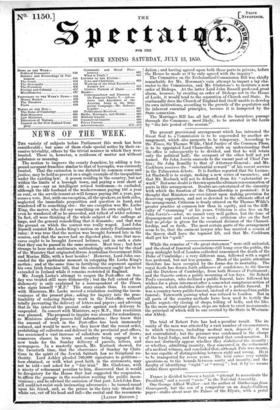While the remains of" the great statesman" were still unburied,
and the cloud of funereal associations still hung over the public, the deep midnight bell of London cathedral announced the death of the Duke of Cambridge ; a very different man, followed with a regret less profound, but not less genuine. Much of the public attention therefore has been occupied by the forms due to mortality. The royal death has drawn forth addresses of condolence, to the Queen and the Dutehess of Cambridge, from both Houses of Parliament; and the Gazette orders a public mourning of ten days. Sir Robert Peel's executors, who declined a public funeral, have followed his wishes for a plain interment after a somewhat sumptuous notion of plainness, which stultifies their objection to a public funeral. It was a country-town public funeral, instead of a metropolitan public funeral ; Tamworth gaining what was refused to London. But in all parts of the country methods have been used to testify the public regret—by closing of shops, tolling of bells, and the like. In the more important places, steps are taken to erect monuments ; the principal of which will be one erected by the State in Westmin- ster Abbey.


























